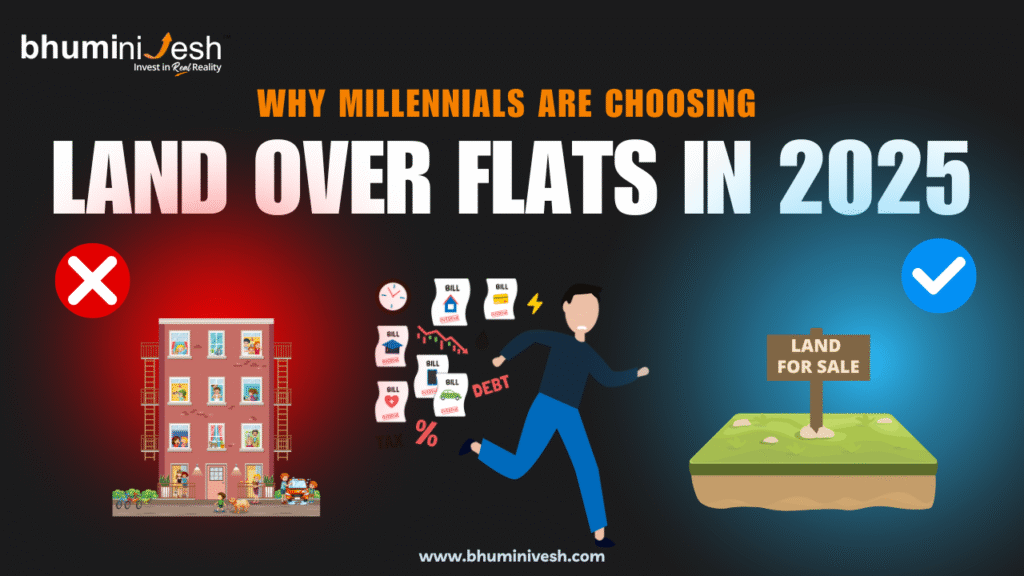
In recent years, the Indian real estate market has witnessed a paradigm shift. Millennials—often dubbed the most urbanized and tech-savvy generation—are making an unexpected yet strategic move: choosing plots of land over ready-to-move flats. What was once considered a domain of older investors or second-home buyers is now a growing preference among young, first-time buyers. The question is, why?
Let’s dig deep into the driving forces behind this millennial-led real estate revolution in 2025.
🧠 1. The Psychology of Ownership: Control Over Creativity
One of the most attractive features of buying a plot is the freedom to design and build. Millennials are not looking for cookie-cutter homes anymore. They want uniquely designed spaces that reflect their personalities, lifestyles, and aspirations.
Whether it’s a minimalist two-floor smart home, a hybrid workspace, or a nature-inspired retreat, owning land offers a blank canvas. Flats, no matter how premium, come with rigid layouts and limitations. This generation craves flexibility and personalization—land allows that.
🏘️ 2. Long-Term Investment with High Appreciation Potential
Plots generally offer higher appreciation than flats, especially in emerging suburban or tier‑2 areas. For example, regions around Ahmedabad, Hyderabad, and Chennai have seen land prices appreciate significantly in the last 3–4 years.
Unlike flats that depreciate over time due to wear and tear, plots retain intrinsic value. There are no building depreciation costs, making them a safer long-term asset. Millennials are recognizing land as a smart wealth-building tool.
🌳 3. The Desire for Open Space and Wellness
The pandemic permanently changed how people perceive space. Millennials, who spent years in compact rented flats or PGs, now crave larger spaces, personal gardens, outdoor areas, and low-density living.
Plots offer just that.
This generation values mental well-being, clean environments, and work-life balance. The idea of building a home away from urban congestion, surrounded by green space, is more appealing than a high-rise apartment in a crowded city.
💸 4. No Maintenance Hassles or Monthly Charges
Flats come with hefty maintenance charges, parking fees, society charges, and repair liabilities. With land, such recurring expenses are minimal or non-existent unless part of a gated community.
Millennials, known for their financial consciousness, prefer properties with lower long-term operational costs. This gives plots another edge in the value equation.
🛣️ 5. Improving Infrastructure in Tier-II & Peri-Urban Areas
A major game-changer is the rapid urbanization of smaller cities and suburban corridors. Government investment in infrastructure—like expressways, metro extensions, smart cities, and IT parks—is opening up new land investment zones.
Locations like:
-
Zirakpur and Kharar (near Chandigarh)
-
Whitefield and Devanahalli (Bangalore outskirts)
-
Ambattur and Oragadam (Chennai suburbs)
-
Bhiwadi and Neemrana (Delhi-NCR)
…are becoming high-growth plotted development hubs, offering millennials the chance to invest in the future of urban India.
📊 6. Affordable Entry Points and Flexible Financing
Contrary to the assumption that land is expensive, many plotted developments now offer EMI-based purchase options, flexible down payments, and lower ticket sizes compared to flats in major metros.
For example, in tier-II cities, one can own a 1000 sq. ft. plot for under ₹15–20 lakhs, which is significantly lower than a 2BHK flat in the same area.
Banks and NBFCs have also started providing plot + construction loans, making it easier for young buyers to plan their dream home gradually.
🧮 7. Millennials Are Financially Smarter and More Strategic
The millennial generation is not buying homes out of social pressure, like previous generations. They are strategic, research-oriented, and seek assets that align with their financial goals, lifestyle, and freedom.
They understand that flats offer convenience, but plots offer potential—a vision they can shape over time. For many, it’s about creating a family legacy or building rental homes, co-working villas, or hybrid spaces that can serve both personal and commercial use.
🏗️ 8. Rise of Gated Plotted Communities
To address the earlier pain points of plot ownership—like poor infrastructure, safety, or lack of amenities—developers are now offering plotted gated communities with:
-
24×7 security
-
Internal roads
-
Power and water supply
-
Clubhouses, parks, and even swimming pools
This hybrid model gives millennials the independence of land with the perks of society living. Projects in areas like Mohali, Pune, and Coimbatore are gaining huge traction.
🧱 9. Flats Have Their Own Limitations
While apartments offer ease and ready possession, they come with clear limitations:
-
Less privacy
-
Shared amenities
-
High maintenance
-
Limited customization
-
Depreciating structure value
Plus, with growing concerns around builder delays, poor construction quality, and legal disputes, millennials are wary of buying under-construction flats. Plots, in contrast, come with greater transparency and often faster registration and possession.
⚠️ 10. Challenges of Choosing Land (That Millennials Are Ready to Tackle)
Of course, buying a plot isn’t without challenges:
-
Approval issues
-
Lack of amenities in remote areas
-
Delayed construction
-
Resale might take longer
However, with access to RERA-registered plots, legal advisory platforms, and well-researched developers, millennials are making informed decisions and mitigating risks better than ever.
🔮 Conclusion: A Shift From Instant Comfort to Long-Term Vision
Millennials are flipping the narrative. Once known as a generation that preferred renting and avoided long-term commitments, they are now strategically investing in land, not for instant gratification, but for long-term dreams.
In 2025, choosing a plot over a flat is not just about real estate—it’s about independence, innovation, and identity. This trend is reshaping the Indian property landscape, and it’s clear: the future belongs to those who dare to dream, and dare to plot.

